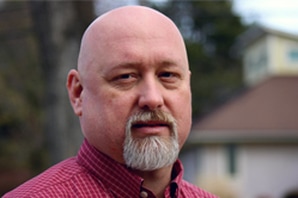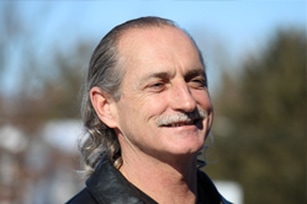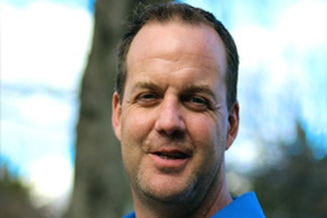|
A Conversation with the Program Director  Program Director, Richi Yowell Program Director, Richi Yowell Richi Yowell became the program director in July 2014, and he brings a vision that is as vibrant as it is forward-looking. His office is a quiet, one-window room, located in the Bender Building, behind the main house. On some days, Yowell spends much of his time here, attending to administrative tasks, preparing to lead group meetings, and talking with individual residents about a variety of concerns they face daily. During other times, Yowell dashes back and forth from his office to the main house, checking on some residents in their rooms, while talking with others in common areas such as the kitchen or front office, and meeting with fellow staff members to stay abreast of current developments in the house. His daily routine offers some insight into the overall nature of Yowell’s work as the program director of Gemeinschaft Home, particularly his role in the lives of residents. Each new day presents a different set of challenges, and Yowell must always find a way to strike a balance between his various responsibilities, pointing out that, “I have to, on one hand, play the disciplinarian, but I also have to be able to have an empathetic ear.” For the most part, Yowell prefers to occupy the latter role, offering guidance and support for residents who struggle with a range of concerns from interpersonal communication, to substance abuse recovery, to post-traumatic stress. Before joining Gemeinschaft Home as the program director, Yowell worked as a probation and parole officer for the Virginia Department of Corrections. But such work largely prevented Yowell from focusing on what he does best, offering guidance and counseling on a sustained, individual basis. Yowell explains that, “Here at Gemeinschaft Home, I can talk to the folks, get involved in their histories. When I had 80 to 100 people in a caseload, I could not take more than 15 to 20 minutes at a time just to check with them one-on-one, because I wouldn’t be getting anything else done.” Yowell argues that his position with Gemeinschaft Home allows him to draw on other aspects of his life experience as well. As an ordained minister, working part-time for a local church, Yowell explains “I’ve gotten to a place in my life right now where everything I do is an extension of ministry.” At Gemeinschaft Home, “I do a lot of the same kinds of work, just listening to people’s problems and trying to help them. I can also interject some aspects of spirituality and faith if it’s welcomed, if it’s invited, and I have prayed with guys before.” The most frustrating aspect of Yowell’s job extends beyond the walls of Gemeinschaft Home and is reflected in broader cultural attitudes about convicted criminals. He explains, “There is a general consensus that they made bad decisions, so they need to be locked up to be punished for those bad decisions, without realizing the root cause of those bad decisions.” As a result, many people are reluctant to welcome formerly incarcerated individuals back into the community after serving a prison sentence, which makes it all the more challenging for residents to move forward in life, after they leave Gemeinschaft Home. “I don’t expect anybody to have a ticker tape parade for these guys coming out of jail or anything,” Yowell admits, “but just an understanding that they can become productive, tax-paying citizens. Many just need a little help: rehabilitation, counseling, and support to integrate back into society.” Yowell argues that “in most cases there are extenuating family circumstances, there is addiction, there are a whole lot of factors that turn somebody into a criminal,” and his goal is help residents to address these deeper (often lifelong) issues while they are in the program. Yet Yowell is quick to point out that the program is no panacea, and the responsibility lies with each resident, who must take an active role in his progress through the program. “The beauty of the program,” he argues, “is that it is an opportunity.” While he is optimistic that residents will take advantage of the opportunity they have during their time in program, Yowell assumes a pragmatic perspective overall, saying “I don’t believe that Gemeinschaft Home cures anybody of criminality or substance abuse in 90 days—I do not think that is really possible—but I do believe that we can give folks some tools and something to think about if they are tempted toward criminal behavior or relapse.” Co-author: Janette Hebert (Intern)  Former resident, William Ross Former resident, William Ross He has been described as a bright light by staff members. His smile is contagious. His free-spirited energy is evident when he enters the room. Yet, to observe him sitting in one spot for any length of time is a rare moment in the case of William Ross who works with the staff and residents of Gemeinschaft Home. A former resident of the program, Ross is originally from the Chesapeake area of Virginia, and he came to Gemeinschaft Home in 2012. Before joining the program at Gemeinschaft Home, Ross claims to have hit rock bottom, and he credits God for saving him from near death and leading him to Gemeinschaft Home, saying, “The only reason I’m here is because of God; without him I would not be here”. After Ross completed the program, he felt as though God wanted him to stay at Gemeinschaft Home, a place that had changed his outlook on life, to help others--residents and staff, as well as people in the local community. His hope for others is to get to a place “where instead of hate you love; instead of lying you tell the truth; instead of seeing just the bad in people; you see the good.” Gemeinschaft Home has been the vehicle for Ross to help others in a way that he says “is meant to be.” A typical day for Ross often involves a variety of activities, owing to the multiple roles he plays in the day-to-day operations of the organization, both as the resident advisor and facilities/maintenance manager. He is a “problem solver on demand,” as one staff member describes him. Whether he is urging, and often transporting, residents to participate in community-based support opportunities or attending to business matters on behalf of Gemeinschaft Home, Ross is an indispensable part of the team-based approach evident among the residents and staff of Gemeinschaft Home. As a resident advisor, Ross has an open door policy and says that he is often needed as early as 6:30 in the morning or as late as midnight. Because he is a former resident, and well-aware of the struggles they face, Ross explains that many residents confide in him about personal issues as well as those within the house. Due to the influx of needed advising for residents, Ross created a room designated as a calming and tranquil space for counseling and spiritual guidance. Ross argues that he was given a second chance in life through his experience at Gemeinschaft Home. “I was grateful to have this opportunity,” he says, “I could die tomorrow and I would be happy. I got a chance to feel what I was supposed to. I always want people to know it is not about me; it is about everyone else.” Ross’ philosophy is best told in his own words: “My life is real, my life is meaningful, my life is joy. This joy never goes away, even when I run into problems or something isn’t going right; I still make it through.” Decision to Make a Better Life by Janette Hebert (Intern)  Current resident, Michael Darden Current resident, Michael Darden Having been bounced around to similar programs with no luck, Michael Darden requested to come to Gemeinschaft Home, after learning about what the program offers. Darden arrived in the fall of 2014, and after completing the program, he now explains, “My 90 days are up; I’m self-pay. I’ve made that choice.” To pay for his room and board, Darden currently works for a local roofing company, but says “I do a little bit of everything; there isn’t anything I can’t do.” Restoring family connections has been one of Darden’s main priorities during his stay at Gemeinschaft Home. While visiting family recently Darden recognized that “my family hasn’t changed, but I have, and they see it.” As someone who has struggled with addiction, Darden discusses the changes he has made in his behavior and how he deals with the temptation to use again. He credits Gemeinschaft Home with giving him a better understanding of how to control his environment and to deal with situations that might trigger him to go back down the wrong road. “I can go out and have dinner with my family, and if they have a drink or something, it’s no big deal,” but Darden admits that the addiction is always there, and he knows that he must work daily to overcome it. Gemeinschaft Home has also provided Darden with other tools for being a productive member of society, including personal finances management, and improved interpersonal skills. “This place has given me patience; I’ve never had patience in my life,” says Darden. Gemeinschaft Home has given him the opportunity to look back on his life and to take personal responsibility for the choices that he has made in the past, in order to move forward in life. He has also been able to save money for a house after his stay at Gemeinschaft Home. However, the counseling aspect of the program has aided Darden the most in his recovery process, saying that “you have resources here; you have people you can talk to, people who are willing to give you good advice.” Darden offers specific praise for resident advisor William Ross, who regularly encourages him to attend AA and NA meetings. His experience in the program has inspired Darden to take the knowledge he has learned to help others, explaining, “When you go through a program like this, and you make the effort, later when you go home, you can try to help another.” In fact, Darden already helps other residents, from offering his emotional support to reminding them of chores that need to be done for the day. For the moment, Darden does not feel fully prepared to leave Gemeinschaft Home, not because he is scared or worried, but because he is still working to accomplish a few goals he has set for himself. Gemeinschaft Home has facilitated Darden’s journey to recovery, and he hopes that the program has the same effect on others. He stresses the point that taking advantage of the program at Gemeinschaft Home offers “a new starting point for your life; this is one of the best opportunities you’re ever going to experience.” Darden concludes, “If you want to change your life Gemeinschaft Home will help you to change your life,” adding, “if you want a different lifestyle, they are here to help you.” |
Archives
August 2023
|